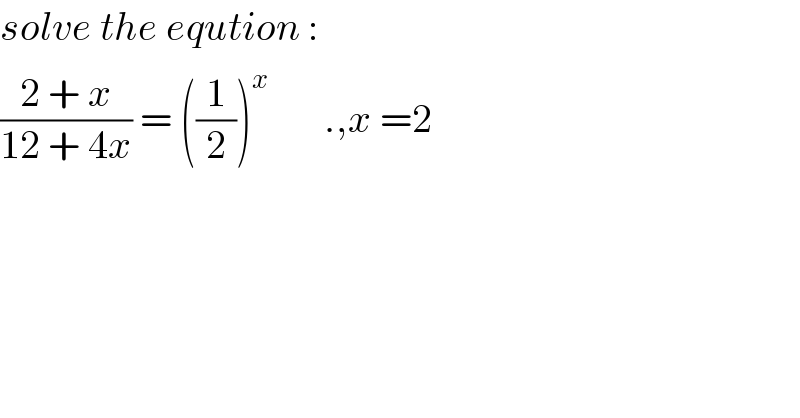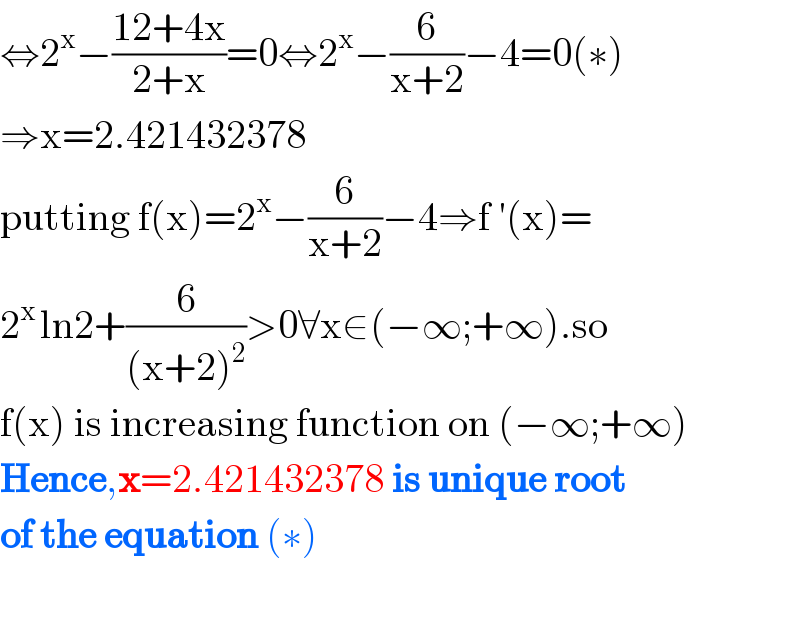Question Number 100916 by 175 last updated on 29/Jun/20

$${solve}\:{the}\:{eqution}\:: \\ $$$$\frac{\mathrm{2}\:+\:{x}}{\mathrm{12}\:+\:\mathrm{4}{x}}\:=\:\left(\frac{\mathrm{1}}{\mathrm{2}}\right)^{{x}} \:\:\:\:\:\:\:.,{x}\:=\mathrm{2}\: \\ $$
Answered by 1549442205 last updated on 30/Jun/20

$$\Leftrightarrow\mathrm{2}^{\mathrm{x}} −\frac{\mathrm{12}+\mathrm{4x}}{\mathrm{2}+\mathrm{x}}=\mathrm{0}\Leftrightarrow\mathrm{2}^{\mathrm{x}} −\frac{\mathrm{6}}{\mathrm{x}+\mathrm{2}}−\mathrm{4}=\mathrm{0}\left(\ast\right) \\ $$$$\Rightarrow\mathrm{x}=\mathrm{2}.\mathrm{421432378} \\ $$$$\mathrm{putting}\:\mathrm{f}\left(\mathrm{x}\right)=\mathrm{2}^{\mathrm{x}} −\frac{\mathrm{6}}{\mathrm{x}+\mathrm{2}}−\mathrm{4}\Rightarrow\mathrm{f}\:'\left(\mathrm{x}\right)= \\ $$$$\mathrm{2}^{\mathrm{x}\:} \mathrm{ln2}+\frac{\mathrm{6}}{\left(\mathrm{x}+\mathrm{2}\right)^{\mathrm{2}} }>\mathrm{0}\forall\mathrm{x}\in\left(−\infty;+\infty\right).\mathrm{so} \\ $$$$\mathrm{f}\left(\mathrm{x}\right)\:\mathrm{is}\:\mathrm{increasing}\:\mathrm{function}\:\mathrm{on}\:\left(−\infty;+\infty\right) \\ $$$$\boldsymbol{\mathrm{Hence}},\boldsymbol{\mathrm{x}}=\mathrm{2}.\mathrm{421432378}\:\boldsymbol{\mathrm{is}}\:\boldsymbol{\mathrm{unique}}\:\boldsymbol{\mathrm{root}} \\ $$$$\boldsymbol{\mathrm{of}}\:\boldsymbol{\mathrm{the}}\:\boldsymbol{\mathrm{equation}}\:\left(\ast\right) \\ $$$$ \\ $$
